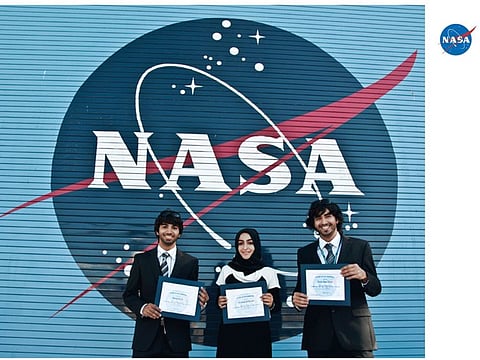Emiratis recall historic internship at NASA 10 years ago
Research fellows say there has been no looking back since

Dubai: It has been 10 years since three Emiratis landed in California’s Silicon Valley to become the first non-Americans to officially intern at the US National Aeronautics and Space Administration (NASA) Ames Research Centre.
Ames Research Centre is one of NASA’s 10 field centres conducting research and development in aeronautics, exploration technology, spaceflight and other sciences aligned with the center’s core capabilities.
The historic UAE-NASA Research Fellowship programme has now reached a 10-year milestone.
The Emirati trio of Shamma Alqassim, Hazza bani Malek and Hamad Al Rajab made history when they became the first non-Americans to officially intern at the NASA centre.
“They worked on actual NASA mission teams for two-and-a-half months in areas of remote sensing, grey water recycling, sustainability and plug-load monitoring,” according to UAE-NASA Research Fellow Alumni Organisation (UNRFAO), which is a programme of the Arab Youth Venture Foundation.
The young Emiratis went on to study at Massachusetts Institute of Technology, Harvard University and Masdar Institute. They have also worked on innovative projects in the UAE’s diversified water, power, and nuclear sectors the past decade.
Cherished memories
Recalling her stint at NASA Ames Research Centre, Alqassim said: “When people first hear about NASA, the first few things that spring to mind are the images of astronauts, satellites and big shiny airplanes. In less than three weeks, I have managed to see and learn about things that I once thought only existed on television. It was truly exhilarating to work at a place where space exploration, rockets and landing on the moon are considered to be completely and utterly normal.”
She adeded: “I have learned a great deal about earthquakes and how a diverse range of factors all become intertwined and affected before the occurrence of this phenomenon. Moreover, I have also become familiar with the different types of satellite data.”
“We were provided exposure to a scientific work environment and an opportunity to become involved in ongoing research projects,” she continued.
Bin Malek, for his part, recalled: “The first week was cool. We attended an orientation day where they introduced us as the first international students – Emiratis!”
“I was assigned to work on some automation upgrades and new implementations to the electrical system of the facility I’m working in. They asked me to modify the original automation code with something new and handed me a six- inch stack of documents to research; and away I went to study. As it turned out, the new device that will be implemented into the whole automation system requires writing my own code, which is kind of cool and a little daunting,” he added.
Al Rajab, meanwhile, always carried a pocket English dictionary.
“I frequently used to look up the meanings of words I did not know. Impossible was one word I have looked up, and was found to be an exact antonym of “possible.” Since then, travelling through the daily path of life has emphasised that impossible is really possible, if you have the will and ambition,” he proudly recalled.
He added: “I had various tasks - from small spacecraft to supercomputers, science missions and payloads, to wind-tunnels, information technology and aerospace. I walked around NASA Ames Research Center from one building to another, and proudly participated in finding engineering solutions that can help in accomplishing actual NASA missions and expanding human knowledge.”










